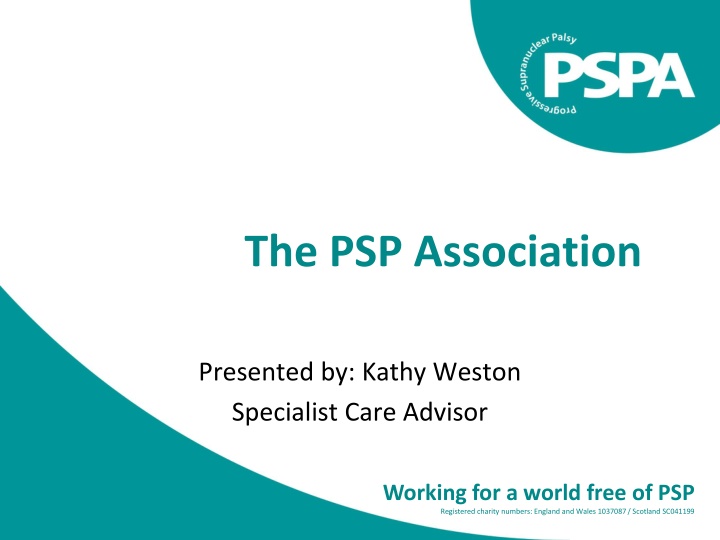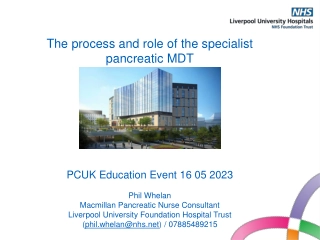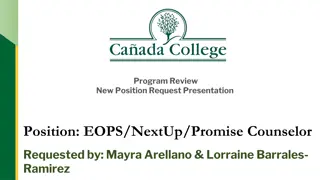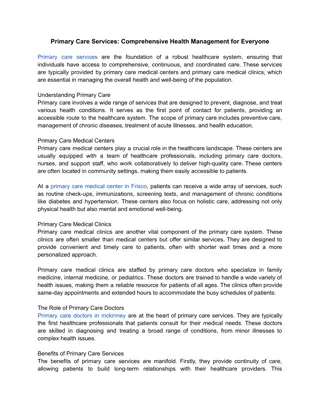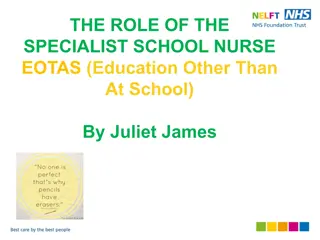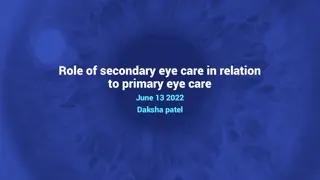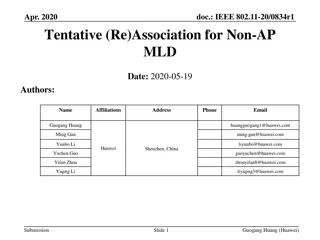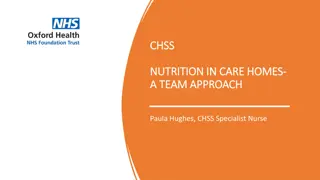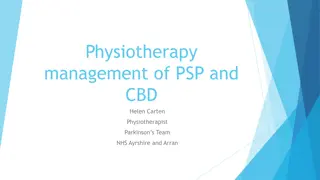The PSP Association: Specialist Care and Support Services
The PSP Association, led by Kathy Weston, offers specialist care and support services for individuals with PSP and CBD. Services include education, research, helpline, and local groups. Learn about the symptoms and key features of PSP, as well as what CBD entails. The organization provides practical, emotional, and informational support through a dedicated helpline and information advisory service staffed by expert care advisors. Explore how the PSP Association is working towards a world free of PSP, with a focus on raising awareness and offering comprehensive assistance to those affected.
Download Presentation

Please find below an Image/Link to download the presentation.
The content on the website is provided AS IS for your information and personal use only. It may not be sold, licensed, or shared on other websites without obtaining consent from the author.If you encounter any issues during the download, it is possible that the publisher has removed the file from their server.
You are allowed to download the files provided on this website for personal or commercial use, subject to the condition that they are used lawfully. All files are the property of their respective owners.
The content on the website is provided AS IS for your information and personal use only. It may not be sold, licensed, or shared on other websites without obtaining consent from the author.
E N D
Presentation Transcript
The PSP Association Presented by: Kathy Weston Specialist Care Advisor Working for a world free of PSP Registered charity numbers: England and Wales 1037087 / Scotland SC041199
What We Offer: Specialist Care Adviser Education Research Local Groups Helpline and information advisory service Person with PSP or CBD & their carer Website/ PSP Matters Health E- Unlocked newsletter
Specialist Care Advisers Six to cover whole of UK Regular proactive contact with all people known to us with PSP/CBD Signposting to relevant statutory and voluntary agencies Recording gaps in service and areas of good practice Dealing with complex cases referred from the Helpline Education Support at some specialist clinics Identifying and developing relationships with key HSCPs Closely working with other staff to develop and promote existing and new initiatives
Helpline and Information Advisory Service Advice Information Practical and emotional support I contacted the Helpline today for the first time. It is a marvelous service. They understood my situation and were so helpful. Information sheets and publications Educational events / Family and Friends Days
Symptoms of PSP Falls - often backwards Postural Instability Eye Problems Swallow Problems Speech Problems Cognitive Changes Bladder and Bowel Pain
Key Features of PSP Little or no response to Levodopa No presenting tremor Rarely affects people under 40 Steady deterioration Restricted eye movement Neurofibrillary tangles not Lewy Bodies
What is CBD? Cortico affecting the brain cortex Basal also affecting other parts of the brain such as the basal ganglia Degeneration death of nerve cells in the brain
What is CBD? Cortico Basal Degeneration Numbness, jerking fingers, loss of use of one hand Asymmetric; progressively affecting arm and leg Alien limb Less common disturbance of eye movement Increased frontal lobe deficit
How is PSP diagnosed Historically the only reliable form of diagnosis was post-mortem Diagnosis was usually given based on the clinical presentation and often delivered as probable PSP
Who is Eligible for NHS Continuing Healthcare? NHS Continuing Healthcare is only available to those who meet specific eligibility criteria and are considered to have a primary health need . Not everyone with a long term condition will be eligible as assessment is based on the nature, complexity, unpredictability and intensity of identified health care needs.
Behaviour (CHC) Frequently there is motor recklessness and impulsivity with lack of insight into risks There may be fixed and rigid thinking making co-operation with aspects of care difficult Challenging behaviour and/or mood changes may exist (e.g. aggression, frustration, depression) requiring specialist advice
Cognition (CHC) Executive functioning skills tend to be affected slowness of thought, difficulty with recall, disorientation and memory loss. May be unable to follow instructions/respond appropriately Capacity to make decisions is often impaired or lost a high level of communication skill required of carers
Psychological/Emotional (CHC) Anxiety, depression and/or agitation may require specialist advice to support and manage Difficulties in sleeping/staying asleep with very disturbed nights Constant fatigue Emotional lability - behaviours may be inappropriate to the situation
Communication (CHC) Speech may be very quiet and slurred or ability to speak at all may be lost Ability to process information may be severely impaired and yes/no responses to questions confused (even when using signs) Eye movements are often restricted so may be unable to use visual aids Ongoing SALT assessment/review required
Mobility (CHC) Motor recklessness and impulsivity often lead to a very high risk of falls (head injuries/fractures) so constant supervision is required and physiotherapy/OT review Restricted vision often negatively impacts on the situation with failure to see hazards May be unable to walk, have severe rigidity in muscles and/or be confined to bed
Nutrition (CHC) The ability to swallow can be lost leading to high risk of aspiration not just on foods but on saliva even if Nil by mouth May require assistance with feeding due to physical limitation of movement and high risk of aspirating PEG may be discussed/fitted Ongoing assessment/review by the SALT and dietitian is essential
Continence (CHC) Incontinence may need managing. Support from a continence adviser may be required management plan will need to consider an individuals cognitive abilities when deciding style of management Constipation management is often an issue Frequent UTI s sometimes without signs of infection
Skin Integrity (CHC) Skin requires regular checking through the day, especially if unable to move limbs independently or walk Individual may not use pressure relieving products despite encouragement to do so Repetitive actions can lead to skin breakdown Hand contractures leading to difficulty maintaining hygiene
Breathing (CHC) There can be a high risk of chest infections due to aspirating on food/drinks/saliva Referral to a respiratory specialist may be required Input from a physiotherapist to advise on chest physiotherapy may be required
Medication (CHC) Medication may need to be managed by skilled carers who can administer the prescribed daily medications and who can ascertain requirement to use other medications (eg for anxiety, agitation, pain etc)
Altered states of consciousness (CHC) Dependent upon stage of the condition Significantly reduced blink rate and involuntary eye closure can make it appear that someone is asleep when they are not
Other Significant Care Needs (CHC) May include management of fatigue, pain and co-existing conditions Cognitive issues can affect any of the 12 domains, making care more complex
Overall Considerations (CHC) PSP is a progressive condition - the course of the condition can be very unpredictable Constant supervision and/or support may be required 24 hours a day A high level of MDT input and co-ordination from a keyworker is required Palliative care services usually have a key role from an early stage
What Does Quality Care Look Like? Holistic approach Right care and support in the right place at the right time Being understood and supported by people who know about the conditions, so that appropriate and timely referrals can be made when needs change Access to timely, accurate and relevant information to enable independence and make informed choices
Palliative Care Improving with awareness of neurological illness Focus on quality of life Potential for rapid deterioration proactive monitoring and symptom management Include on GP palliative care registers / Gold Standards Framework (GSF) Referral to specialist palliative care Need for multi-disciplinary / multi agency care Preferred Priorities of Care Advance care planning Advanced Decisions Mental Capacity Continuing Care Assessment Hospice, respite care, outreach team Carer support
A Carers View This disease just takes and takes and then takes again. Is there nothing that it will leave us, so we can have a tiny bit of normality (Anon Health Unlocked 2014)
A Carers View Sometimes I wonder what will happen if I just can t do this anymore. And I know that is not an option. But the thing is I love him and sometimes I see him again, just for a moment, before he turns back into this person he has become it breaks my heart I am very, very tired and sad. (Jill - Health Unlocked 4 Dec 2014)
Further Reading https://www.youtube.com/watch?v=VVWGutY0xbw https://www.youtube.com/watch?v=uU2cLUlhN2s Dudley Moore: An Intimate Portrait by Rena Fruchter Last Dance at the Savoy: Life, Love and Caring for Someone with Progressive Supranuclear Palsy by Kathryn Leigh Scott and Dr. Yvette Bordelon You, me and PSP by Steve Dagnell available exclusively from PSPA
For more information Please look at our website: www.pspassociation.org.uk or Telephone: 0300 0110 122 or Email: helpline@pspassociation.org.uk or Write to us at: The PSP Association PSP House 167 Watling Street West Towcester Northamptonshire NN12 6BX
